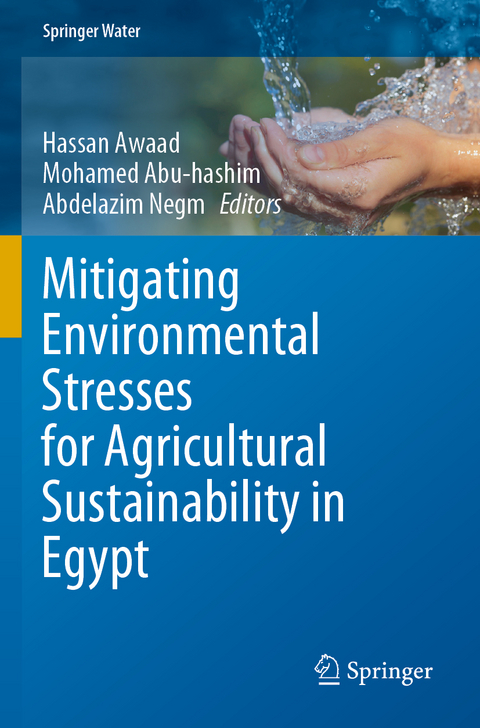
Mitigating Environmental Stresses for Agricultural Sustainability in Egypt
Springer International Publishing (Verlag)
978-3-030-64325-6 (ISBN)
This book focuses on the soil and environmental resources and how to utilize them under Egyptian conditions to achieve tolerance to environmental abiotic stresses, i.e., drought, heat, salt, pollutants, and biotic stresses such as disease resistance. Further, it explores ways to increase productivity, improve the quality of field crops, and reduce the food gap. The application of modern technologies is an essential mechanism for improving crops' productivity through laser, seed technology, mycorrhiza, and biotechnology to enhance the yield of genotypes in sustainable farming systems. Therefore, this book discusses fundamental ways to increase productivity under various environmental circumstances.
The book reflects the enormous potential held by horizontal expansion in the newly reclaimed lands in Egypt. Tapping that potential depends on developing crops that are highly tolerant to environmental stresses and mitigating the impacts of climate changes around the world tohelp Egypt and countries with similar weather and water deficits achieve the 2030 sustainability agenda for agriculture. Given its profundity and scope, the book offers a valuable asset for stakeholders, policy planners, decision-makers, researchers, and scientists in Egypt and worldwide.
lt;p>Prof. Dr Hassan Auda Awaad is the professor of crop breeding at the faculty of agriculture, Zagazig University. Dr. Awaad got his Ph.D.1992 "Breeding Studies on Some Wheat Crosses," Assistant Professor on 24/2/1998 and Professor on 25/3/2003, General Specialization: Crops, Current Specialization: Crop breeding. Published more than 48 research and articles, published 6 Books in the field of physiology, crop breeding and biotechnology in Arabic language and produced new promising lines in wheat crop. Member of the Permanent Commission for the Promotion of professors and assistant professors, Member of the Egyptian Society of Crop Science, Egyptian Society of Plant Breeding, Egyptian Society of Applied Sciences, and National Association of Science and Technology. Member and Principal Alternate Researcher and Consultant for several research projects. He supervised 18 Master's and Doctorate's degrees.
Dr. Mohamed Abu-hashim is the Contact person and the Associate partner of EXCEED - SWINDON - Middle East North Africa program "International Network on Sustainable Water and Environmental Management in Developing Countries. Dr. Abu-hashim is the manager of Technology Transfer Office (TTO), and the Director of Project Management Unit, F. Ag., Zagazig University. Dr. Abu-hashim received his Ph. D. in Water Resource Management from the Faculty of Civil Engineering and Environmental Science, TU-Braunschweig, Germany. His main subject is Agricultural Engineering, Hydrology modelling, Geoecology, Subsidiary subjects: water resource management, environmental risk assessment, and soil sciences. Currently, Dr. Abu-hashim works in several national and international projects; Director and the coordinator of the international afforestation project in the MENA region "Development of salt-tolerant agricultural practices and afforestation for bioremediation and CO2 sequestration in the Middle East Region". Dr. Abu-hashim is the Egyptian coordinator of the ERANETMED project funded by the EU with the title "Decentralized treatment wetlands for sustainable water management in rural and remote areas of semi-arid regions" with several countries. Dr. Abu-hashim is the Principal Investigator of Zagazig University for the TEMPUS Project entitled: Establish a new joint master's degree in biotechnology applied to Agro-science, environment, and pharmacology. Dr. Abu-hashim published several papers related to remote sensing and GIS technique in climate change and water resource management in Egypt.
Introduction.- Drought tolerance in some field crops.- Drought tolerance in some field crops.- Performance and genetic diversity in water stress tolerance and relation to wheat productivity under rural regions.- Heat stress tolerance, challenges and proposed solutions.- Environmental pollution tolerance in crop plants.- Performance, adaptability and stability of promising bread wheat lines across different environments.
| Erscheinungsdatum | 11.02.2022 |
|---|---|
| Reihe/Serie | Springer Water |
| Zusatzinfo | XIV, 590 p. 120 illus., 77 illus. in color. |
| Verlagsort | Cham |
| Sprache | englisch |
| Maße | 155 x 235 mm |
| Gewicht | 914 g |
| Themenwelt | Naturwissenschaften ► Biologie ► Ökologie / Naturschutz |
| Naturwissenschaften ► Geowissenschaften ► Hydrologie / Ozeanografie | |
| Sozialwissenschaften ► Politik / Verwaltung | |
| Schlagworte | Abiotic stresses • Agricultural practices • Agriculture Engineering • Bio fertilizer • Biotic stresses • Laser levelling • nanotechnology • pollution • Tolerant cultivars • Water Policy • water scarcity |
| ISBN-10 | 3-030-64325-5 / 3030643255 |
| ISBN-13 | 978-3-030-64325-6 / 9783030643256 |
| Zustand | Neuware |
| Haben Sie eine Frage zum Produkt? |
aus dem Bereich


